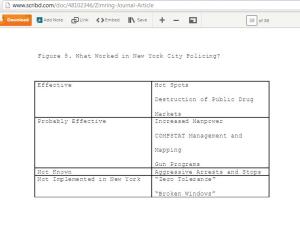
Kelly for his part has doubled down, claiming in a Wall Street Journal editorial that the stop and frisk practice is part of good policing, a reason for New York City's dropping crime rate which has saved "7,383 lives," most of them young men of color. But Alex Pareene has provided a point-by-point rebuttal to the Kelly piece in Salon.com. And MSNBC "Morning Joe" co host Mika Brzezinski pushed back on the claim in an interview with Kelly yesterday, pointing out "... the numbers... show that the people who are stopped and frisked are primarily minorities and primarily end up to be found doing nothing wrong. So one of the arguments would be that going up to people who are doing nothing wrong is not stopping crime -- it's breeding resentment and playing a dangerous game of profiling that could explode at some point." (Quote via Mediaite and Mike Riggs.) A "room for debate" collection in The New York Times yesterday offers opinions on both sides of the Kelly question.

Briefly, Zimring is a big fan of the innovations that New York City police have made in recent decades, which he credits with gaining a drop in crime going significantly beyond that seen by other cities during the same time period. Zimring is careful, however, to note that just because the NYPD tried new tactics during the time that that happened, doesn't mean that every one of those tactics was necessarily successful. There are two programs he believes were clearly effective, according to a chart on page 29 -- the targeting of "hot spots" and the destruction of public drug markets. (Though Zimring notes that drug sales did not decrease as a result of shutting down the markets -- they just shifted into less visible forms that produce less crime.)
There are three tactics Zimring believes probably were effective, according to the chart -- increased manpower, COMPSTAT management and mapping, and gun programs.
And there is one tactic Zimring points out for which it is "not known" whether it was effective or not. Care to guess which one that was? You guessed right -- it's "aggressive arrests and stops" -- the very practice for which Kelly is now loudly proclaiming success, despite the heavy criticisms that have been heaped upon it.
Which means one of two things: Either Kelly knows that stop and frisk has not been proven to be successful, but is trying to put one over on the rest of us; or he believes it works, but without evidence, and has made key decisions about policing policy and civil liberties with insufficient basis.
Whatever one thinks about stop and frisk, and whatever further research ultimately may determine about it, there's another reason to object to Kelly's proposed DHS appointment. While conducting numerous stops and searches of New Yorkers, police have gone on to arrest many of them for minor offenses -- including marijuana possession, and at sky-high rates. This is actually a pattern common to cities large and small around the country -- police frequent certain neighborhoods, do lots of searches while they're there, and then arrest people for any small thing they find, not just for the serious crimes they' (sincerely or ostensibly) go to the neighborhoods to fight. The result is gaping-wide disparities in who gets arrested for crimes like possession -- people use drugs as much if not more in the nice parts of town, but police don't go there as much or stop many people who live there when they do. This combination of otherwise defensible targeting of high-crime neighborhoods for police presence, but combined with the strict arrest policies that have become common the last few decades, is one of the major driving forces of racial disparity in the criminal justice system, perhaps the leading one.
But the bigger problem here for Kelly is that in New York State it is illegal for police to make most of these marijuana arrests -- because marijuana is decriminalized in New York State unless the possessor has it in public view. What researchers like Harry Levine have documented is that police in New York City have a practice of ordering people to remove any marijuana from their pockets where it was hidden, and then arresting them for having it in public view -- even though it only came into public view because a police officer coerced the defendant into displaying it!
These are illegal arrests, and they happen tens of thousands of times every year in New York City. In September of 2011 Kelly acknowledged the problem by sending a memo to NYPD officers instructing them not to do that any more. Kelly was appointed commissioner in 2002, for the second time, nine years before sending the memo . He only took action to stop this widely-known, very widespread lawbreaking by his officers, that directly violates the rights of New Yorkers, after it was repeatedly publicized in the media and taken up by legislators. And since the memo went out, NYPD officers have continued to engage in the practice about 80% as often as they did before. It's better that Kelly sent the memo compared with if he never did anything about the issue. But "too little, too late" is an understatement, and now he's aggressively defending the root stop and frisk practice that sustains the illegal arrest campaign.
Kelly may be a skillful commissioner whose work has done good in some ways for the city; I'm willing to believe that. But his unconcern for rule of law and civil rights, his apparently complete insensitivity to issues of inappropriate profiling, and his willing to propagandize in the media, make him a poor choice for Homeland Security, an area of government in which all those concerns take on special weight due to its nature. I hope that Sen. Schumer and Pres. Obama will heed the warnings. It's good to talk about race and the justice system, but if you really care about it then your actions -- whom you appoint, and for what -- are what count.
This work by StoptheDrugWar.org is licensed under Creative Commons Attribution-ShareAlike 4.0 International
Add new comment